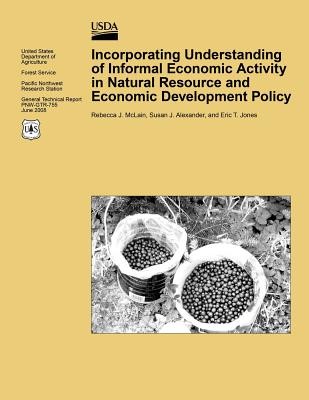
- We will send in 10–14 business days.
- Author: United States Department of Agriculture
- Publisher: CreateSpace Independent Publishing Platform
- ISBN-10: 1508756554
- ISBN-13: 9781508756552
- Format: 21.6 x 28 x 0.3 cm, softcover
- Language: English
- SAVE -10% with code: EXTRA
Incorporating Understanding of Informal Economic Activity in Natural Resource and Economic Development Policy (e-book) (used book) | bookbook.eu
Reviews
Description
This report synthesizes the literature on the role of informal economic activity in the United States postindustrial economy. Informal economic activity is expanding in the United States and is likely to continue in the foreseeable future. The formal and informal economic sectors are inextricably intertwined, with individuals and households combining elements of both sectors to construct their livelihoods. Although the informal economy is often thought of as the domain of economically marginal individuals and households, virtually everyone participates in the informal economy to some extent. However, the literature highlights how factors such as social status and household position in the formal economy affect whether participation in informal economic activity is exploitative or empowering. The nontimber forest products sector serves as a case study of why it is important to consider informal economic activity when developing natural resource and economic development policy. We recommend steps policymakers can take to identify and encourage positive aspects of the informal economic activity. We also highlight several areas of research to improve understandings of the role of informal economic activity in postindustrial societies.
EXTRA 10 % discount with code: EXTRA
The promotion ends in 18d.05:14:11
The discount code is valid when purchasing from 10 €. Discounts do not stack.
- Author: United States Department of Agriculture
- Publisher: CreateSpace Independent Publishing Platform
- ISBN-10: 1508756554
- ISBN-13: 9781508756552
- Format: 21.6 x 28 x 0.3 cm, softcover
- Language: English English
This report synthesizes the literature on the role of informal economic activity in the United States postindustrial economy. Informal economic activity is expanding in the United States and is likely to continue in the foreseeable future. The formal and informal economic sectors are inextricably intertwined, with individuals and households combining elements of both sectors to construct their livelihoods. Although the informal economy is often thought of as the domain of economically marginal individuals and households, virtually everyone participates in the informal economy to some extent. However, the literature highlights how factors such as social status and household position in the formal economy affect whether participation in informal economic activity is exploitative or empowering. The nontimber forest products sector serves as a case study of why it is important to consider informal economic activity when developing natural resource and economic development policy. We recommend steps policymakers can take to identify and encourage positive aspects of the informal economic activity. We also highlight several areas of research to improve understandings of the role of informal economic activity in postindustrial societies.


Reviews